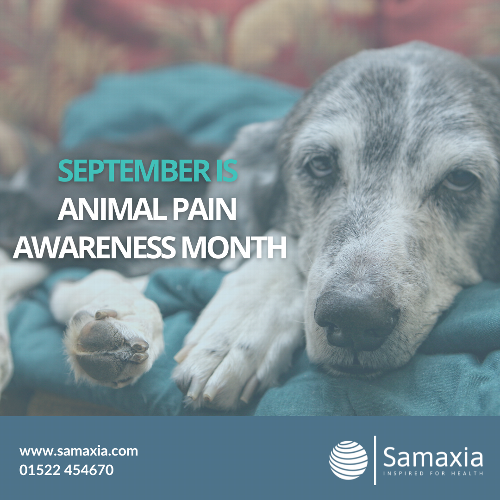This September, as we observe Animal Pain Awareness Month, it's vital for both veterinary professionals and pet owners to refine their understanding of pain management in pets. Recognising subtle signs of discomfort in dogs, cats, and rabbits is essential to improving their quality of life. Samaxia is committed to leading the veterinary community by endorsing comprehensive care practices that manage pain and enhance comfort.
Recognising Signs of Pain in Dogs, Cats, and Rabbits
Subtle behaviours and symptoms might indicate discomfort in pets:
- Decreased Activity: A reduction in usual playfulness or general activity can be an early sign of pain.
- Mobility Difficulties: Difficulties with stairs in dogs, reluctance to jump in cats, and less frequent hopping in rabbits can all suggest joint pain or arthritis.
- Changes in Eating Habits: Decreased appetite may stem from dental pain or other internal discomfort.
- Excessive Grooming: Persistent grooming of a particular area might indicate localised pain.
Integrating Medical and Non-Medical Interventions
Early and Regular Consultations: Timely veterinary consultations are crucial. Recognising and addressing pain early can prevent further complications.
Customised Comfort Strategies: Adjust the living environment to reduce stress on painful joints or muscles, and consider the following:
- Orthopaedic Beds and Supportive Accessories: These can provide relief and improve the quality of sleep.
- Gentle, Tailored Exercise: Appropriate exercise helps maintain mobility and can decrease pain over time.
- Temperature Control: Keeping pets warm can help soothe achy joints, especially during colder months.
Use of Non-Prescription Supplements
Supporting Overall Comfort: Non-prescription supplements such as omega-3 fatty acids, glucosamine, chondroitin, and Palmitoylethanolamide (PEA) are often recommended by veterinarians to help support the overall comfort levels of pets. These supplements are intended to complement a pet's diet and contribute to their general well-being.
Veterinary Guidance: It's important to consult with a veterinary professional before introducing any supplements. A vet can ensure that any additions to your pet's diet are suitable for their specific health needs and are integrated effectively into their overall health management plan.
Conclusion
As we mark Animal Pain Awareness Month, we encourage a holistic approach to pet care among veterinary professionals and urge pet owners to seek support early if they notice signs of discomfort in their pets.
Recognising and addressing the signs of pain early can significantly improve the interventions and overall outcomes for our beloved animals. By integrating both medical treatments and supportive measures like non-prescription supplements under veterinary guidance, we can work together to ensure pets lead happier, healthier lives.

